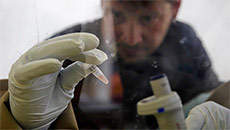NEW YORK — A lab study has found that Zika can infect embryonic cells that help form the brain, adding to evidence that the virus causes a serious birth defect.
The mosquito-borne virus, which is spreading in Latin America and the Caribbean, normally causes only mild symptoms, if any in adults. But scientists are alarmed by indications that when it infects a pregnant woman, her baby may be born with a small head and a brain that hasn't developed properly.
Researchers suspect Zika infection causes the condition, called microcephaly, but are still trying to prove it. Reports have documented traces of the virus in the brains of babies with microcephaly who'd died soon after birth, and in fetal brain tissue after abortion.
The new work provides experimental evidence that once the virus reaches the developing brain, it can infect and harm cells that are key for further brain development, said Hengli Tang of Florida State University, a lead author of the work.
Results were released Friday by the journal Cell Stem Cell.
The study found that infection can harm these cells in two ways: killing some outright and damaging the ability of others to divide and grow in number. The cells, when healthy, help build the part of the brain that is affected in microcephaly, Tang said. So it would make sense that the damaging effect of Zika on those cells may bring on that condition, he said.

But he stressed that his study does not prove that Zika causes microcephaly, nor that it works by that route. A number of other viruses are known to trigger the condition.
Researchers did not take the brain cells from embryos; they created them from stem cells obtained from other sources.
Dr. Anthony Fauci, director of the National Institute of Allergy and Infectious Diseases, who did not participate in the research, agreed that the study doesn't prove a link to Zika. But "it certainly adds weight to the argument," he said.
And the idea that Zika may cause the condition by harming the specific kind of brain cell used in the study is feasible, he said.
Researchers also found that infected cells pump out more virus.
Dr. Guo-li Ming of Johns Hopkins University, another lead study author, said researchers can now explore questions like how Zika infects the cells.

Tang said he is collaborating with other labs to look for substances that will block Zika infection of cells. If such a substance can be turned into a drug, it might be useful to give to pregnant women in high-risk areas who've been bitten by mosquitoes, he said. Such treatment might suppress the amount of virus in a woman's body, which in turn may reduce the risk of infecting her fetus, Tang said.





